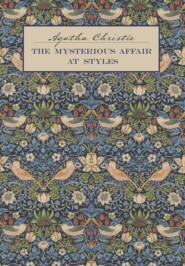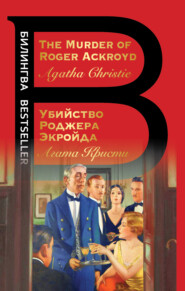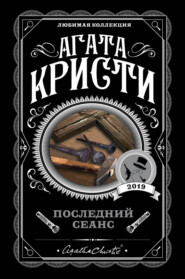По всем вопросам обращайтесь на: info@litportal.ru
(©) 2003-2024.
✖
The Dead Man’s Mirror: A Hercule Poirot Short Story
Автор
Год написания книги
2018
Настройки чтения
Размер шрифта
Высота строк
Поля
‘You see a definite reason for going down to Hamborough Close?’
Slowly, Poirot shook his head.
‘No,’ he said. ‘As far as I can see, there is no reason at all. But, all the same, I fancy I shall go.’
Hercule Poirot sat in the corner of a first-class carriage speeding through the English countryside.
Meditatively he took from his pocket a neatly-folded telegram, which he opened and re-read:
Take four-thirty from St Pancras instruct guard have express stopped at Whimperley.
CHEVENIX-GORE.
He folded up the telegram again and put it back in his pocket.
The guard on the train had been obsequious. The gentleman was going to Hamborough Close? Oh, yes, Sir Gervase Chevenix-Gore’s guests always had the express stopped at Whimperley. ‘A special kind of prerogative, I think it is, sir.’
Since then the guard had paid two visits to the carriage – the first in order to assure the traveller that everything would be done to keep the carriage for himself, the second to announce that the express was running ten minutes late.
The train was due to arrive at 7.50, but it was exactly two minutes past eight when Hercule Poirot descended on to the platform of the little country station and pressed the expected half-crown into the attentive guard’s hand.
There was a whistle from the engine, and the Northern Express began to move once more. A tall chauffeur in dark green uniform stepped up to Poirot.
‘Mr Poirot? For Hamborough Close?’
He picked up the detective’s neat valise and led the way out of the station. A big Rolls was waiting. The chauffeur held the door open for Poirot to get in, arranged a sumptuous fur rug over his knees, and they drove off.
After some ten minutes of cross-country driving, round sharp corners and down country lanes, the car turned in at a wide gateway flanked with huge stone griffons.
They drove through a park and up to the house. The door of it was opened as they drew up, and a butler of imposing proportions showed himself upon the front step.
‘Mr Poirot? This way, sir.’
He led the way along the hall and threw open a door half-way along it on the right.
‘Mr Hercule Poirot,’ he announced.
The room contained a number of people in evening dress, and as Poirot walked in his quick eyes perceived at once that his appearance was not expected. The eyes of all present rested on him in unfeigned surprise.
Then a tall woman, whose dark hair was threaded with grey, made an uncertain advance towards him.
Poirot bowed over her hand.
‘My apologies, madame,’ he said. ‘I fear that my train was late.’
‘Not at all,’ said Lady Chevenix-Gore vaguely. Her eyes still stared at him in a puzzled fashion. ‘Not at all, Mr – er – I didn’t quite hear –’
‘Hercule Poirot.’
He said the name clearly and distinctly.
Somewhere behind him he heard a sudden sharp intake of breath.
At the same time he realized that clearly his host could not be in the room. He murmured gently:
‘You knew I was coming, madame?’
‘Oh – oh, yes …’ Her manner was not convincing. ‘I think – I mean I suppose so, but I am so terribly impractical, M. Poirot. I forget everything.’ Her tone held a melancholy pleasure in the fact. ‘I am told things. I appear to take them in – but they just pass through my brain and are gone! Vanished! As though they had never been.’
Then, with a slight air of performing a duty long overdue, she glanced round her vaguely and murmured:
‘I expect you know everybody.’
Though this was patently not the case, the phrase was clearly a well-worn formula by means of which Lady Chevenix-Gore spared herself the trouble of introduction and the strain of remembering people’s right names.
Making a supreme effort to meet the difficulties of this particular case, she added:
‘My daughter – Ruth.’
The girl who stood before him was also tall and dark, but she was of a very different type. Instead of the flattish, indeterminate features of Lady Chevenix-Gore, she had a well-chiselled nose, slightly aquiline, and a clear, sharp line of jaw. Her black hair swept back from her face into a mass of little tight curls. Her colouring was of carnation clearness and brilliance, and owed little to make-up. She was, so Hercule Poirot thought, one of the loveliest girls he had seen.
He recognized, too, that she had brains as well as beauty, and guessed at certain qualities of pride and temper. Her voice, when she spoke, came with a slight drawl that struck him as deliberately put on.
‘How exciting,’ she said, ‘to entertain M. Hercule Poirot! The old man arranged a little surprise for us, I suppose.’
‘So you did not know I was coming, mademoiselle?’ he said quickly.
‘I hadn’t an idea of it. As it is, I must postpone getting my autograph book until after dinner.’
The notes of a gong sounded from the hall, then the butler opened the door and announced:
‘Dinner is served.’
And then, almost before the last word, ‘served’, had been uttered, something very curious happened. The pontificial domestic figure became, just for one moment, a highly-astonished human being …
The metamorphosis was so quick and the mask of the well-trained servant was back again so soon, that anyone who had not happened to be looking would not have noticed the change. Poirot, however, had happened to be looking. He wondered.
The butler hesitated in the doorway. Though his face was again correctly expressionless, an air of tension hung about his figure.
Lady Chevenix-Gore said uncertainly:
‘Oh, dear – this is most extraordinary. Really, I – one hardly knows what to do.’
Ruth said to Poirot:
‘This singular consternation, M. Poirot, is occasioned by the fact that my father, for the first time for at least twenty years, is late for dinner.’
‘It is most extraordinary –’ wailed Lady Chevenix-Gore. ‘Gervase never –’

















